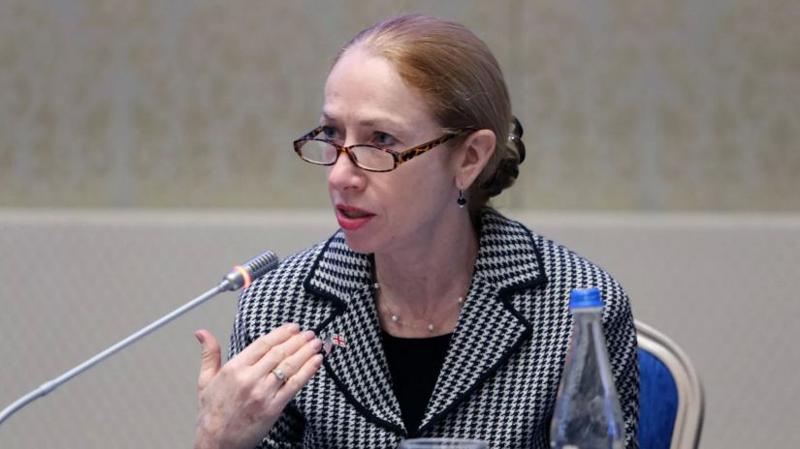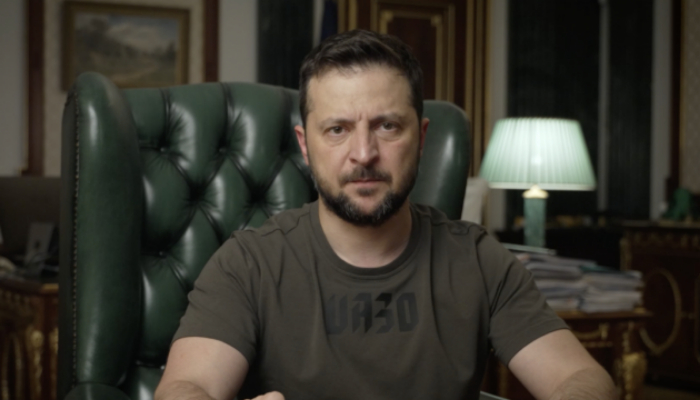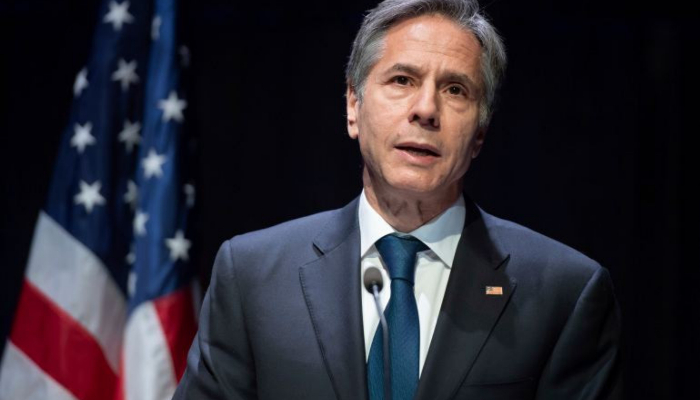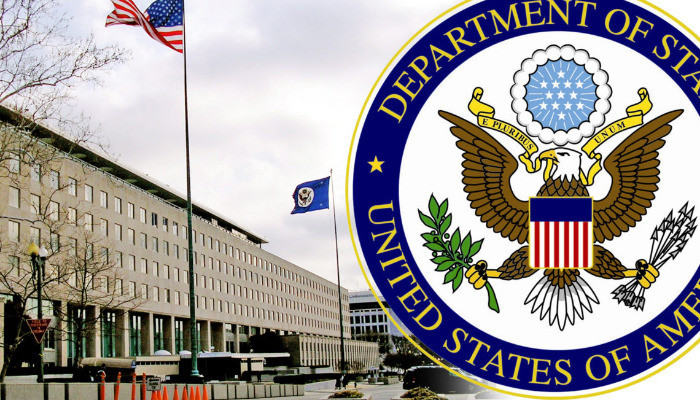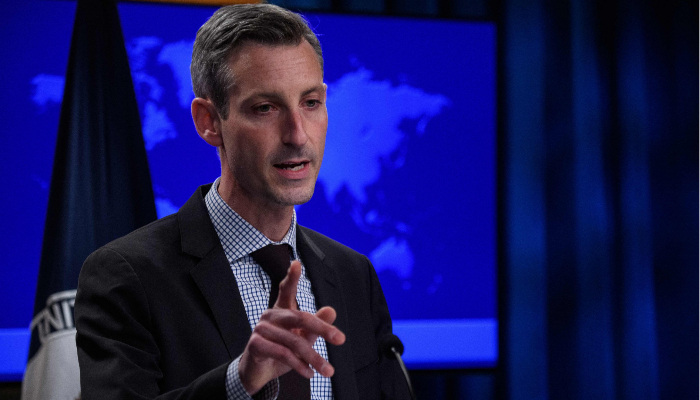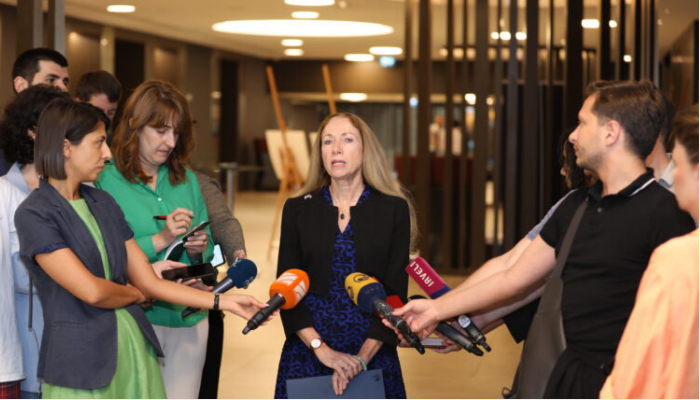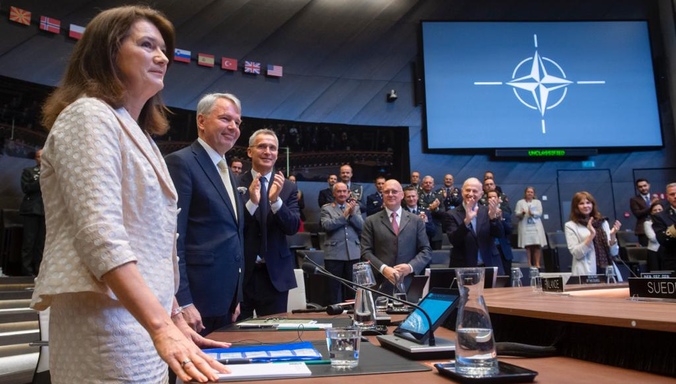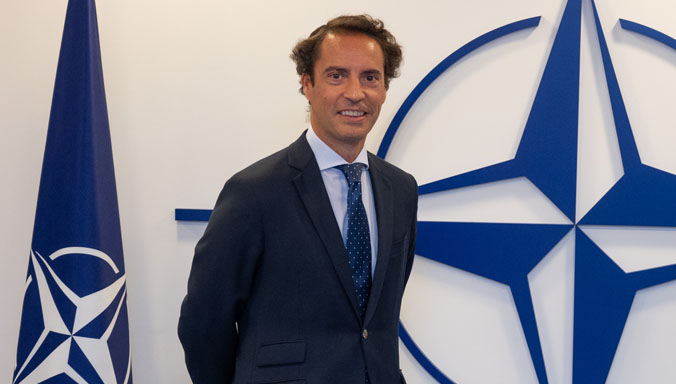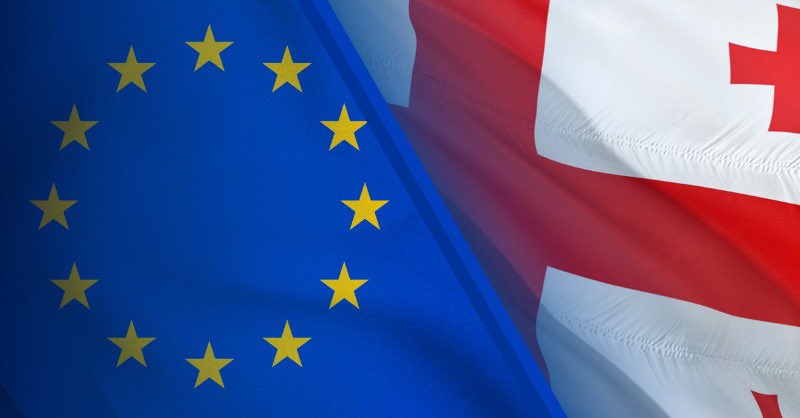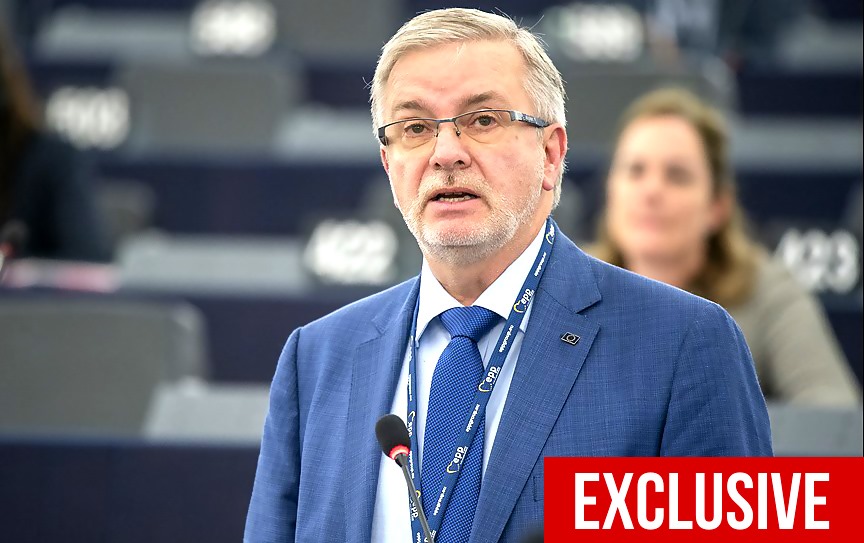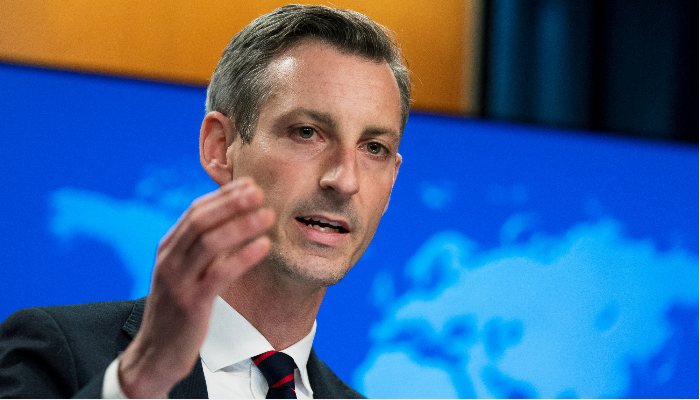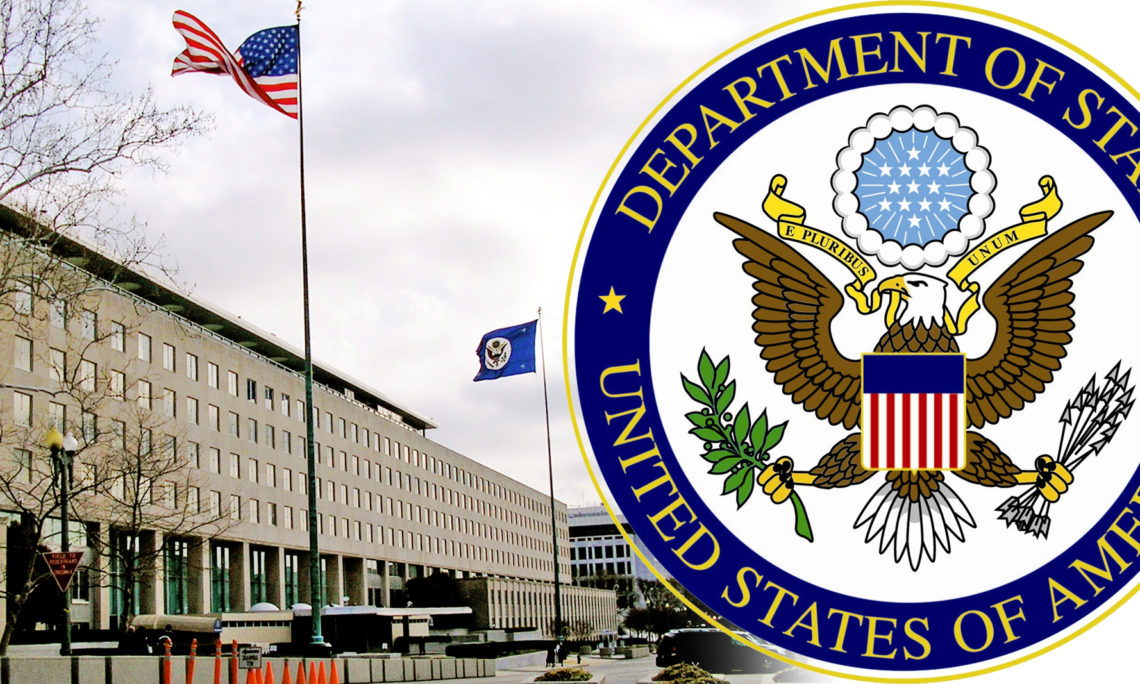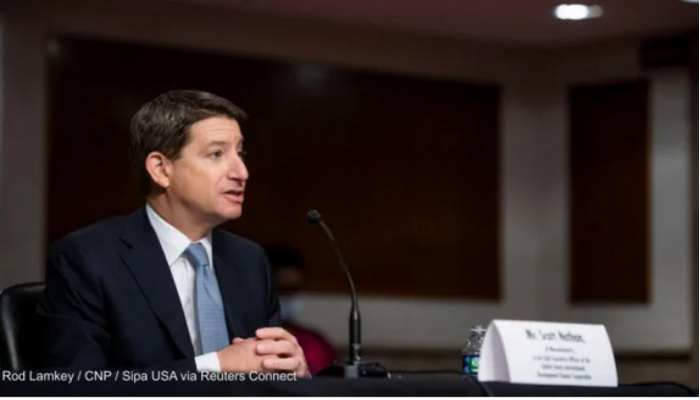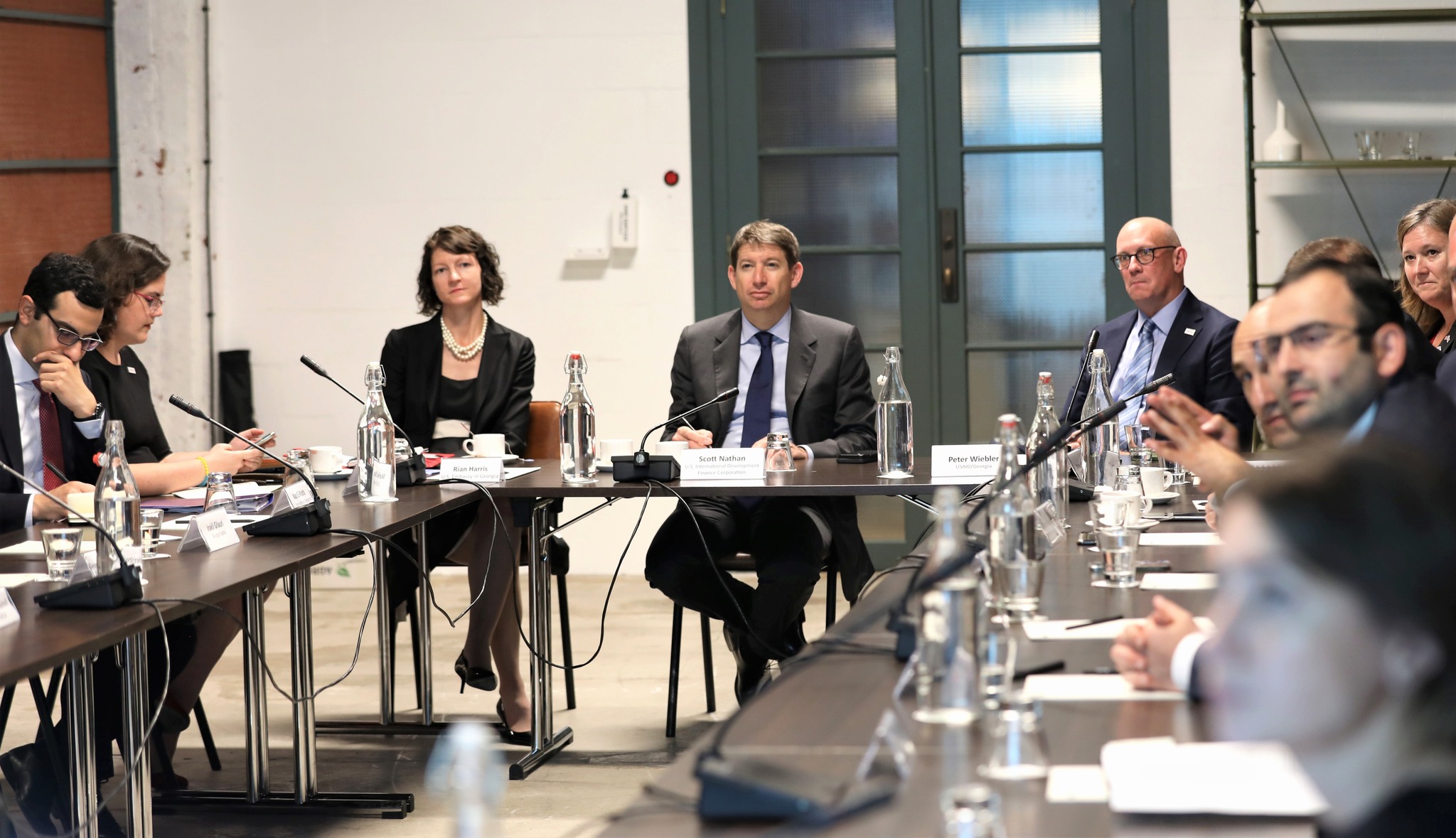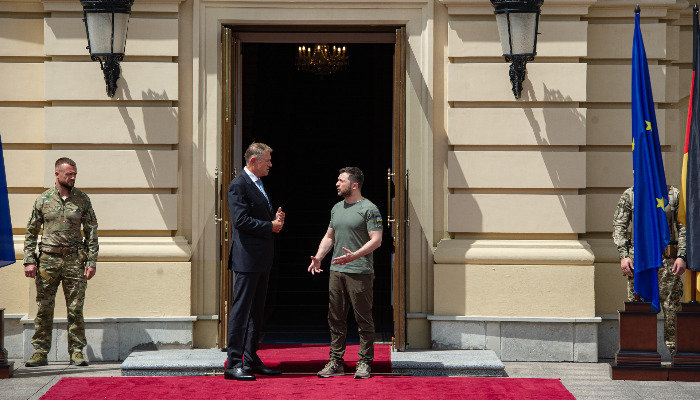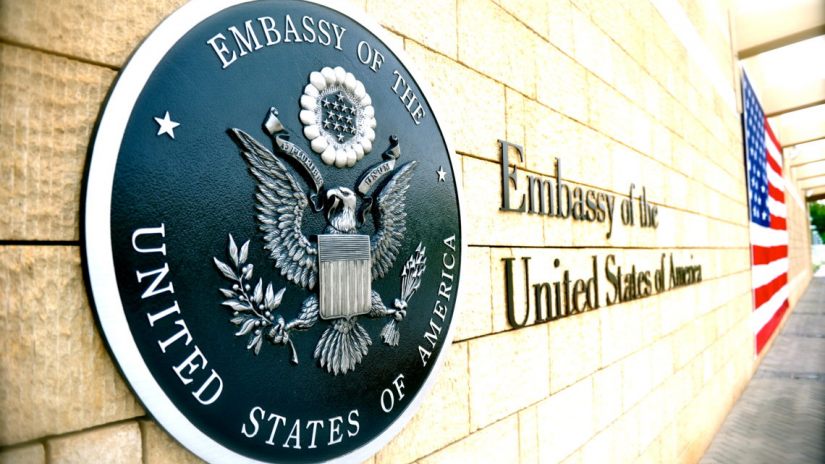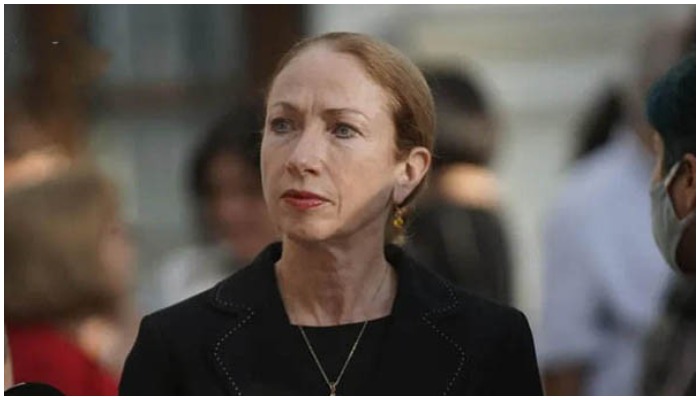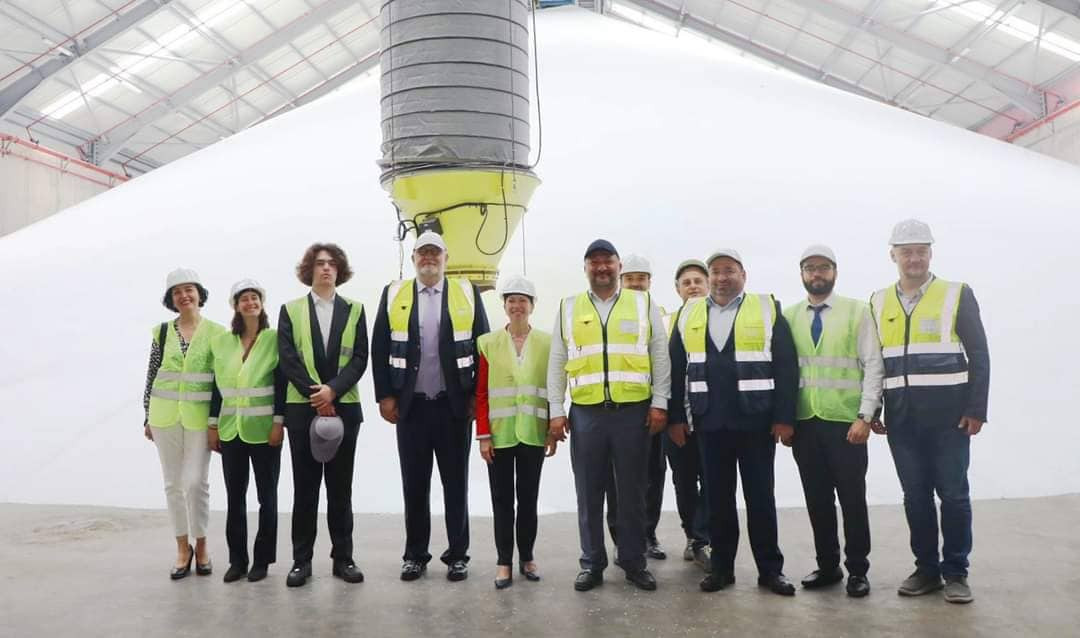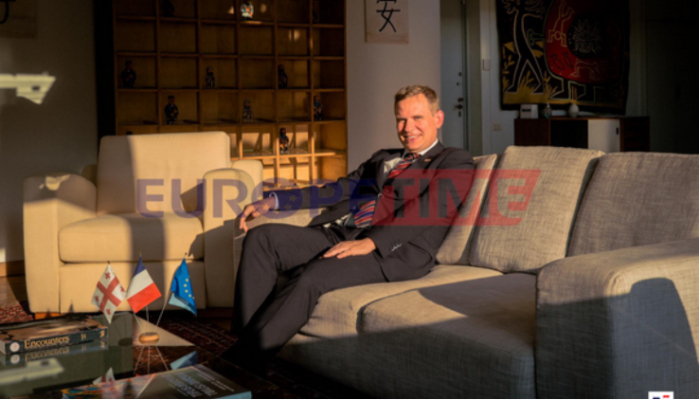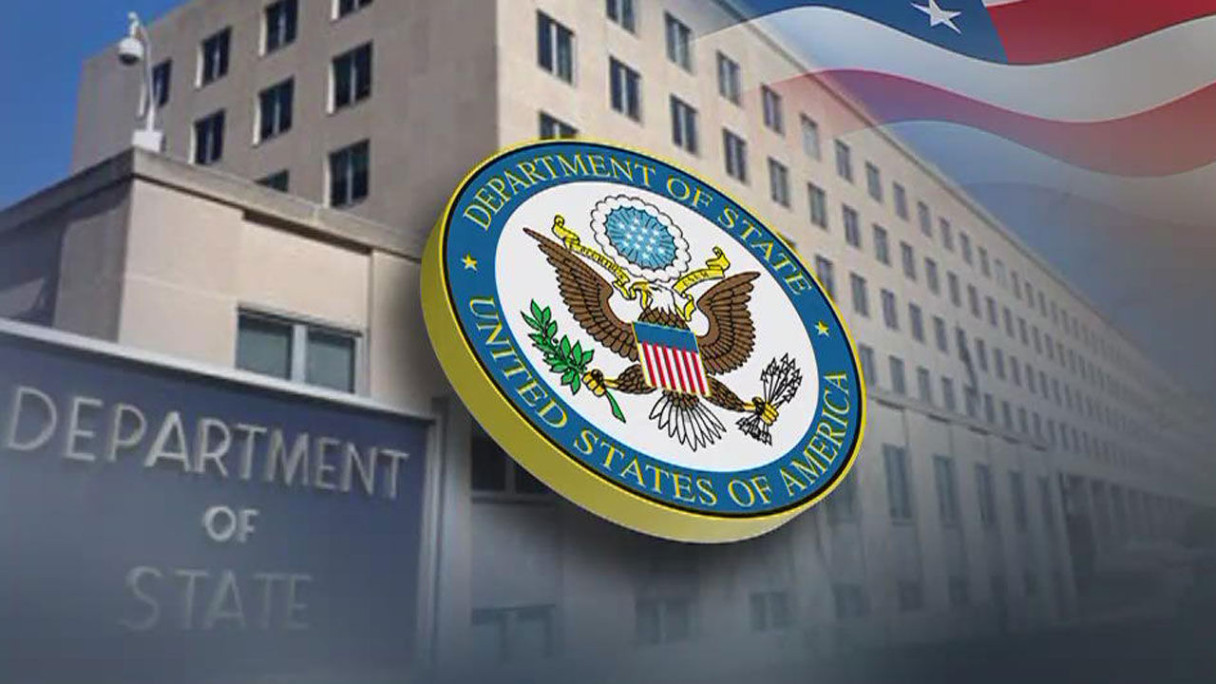news
Ambassador Degnan: Things like Gavrilov’s night, things like broken political promises and anti-democratic actions - that’s where this depolarization came from, not from Western partners
„I think it’s important for Georgians to remember, to look back three years, four years, and remember where this depolarization came from. Things like Gavrilov’s night, things like broken political promises and anti-democratic actions. That’s where this depolarization came from, not from Western partners“, - US Ambassador to Georgia Kelly Degnan stated. The U.S. ambassador emphasized that the accusations made against the U.S. and others "are reckless conspiracy theories that have no basis. Ambassador Degnan: Let me start by saying that for decades we have been working with Georgia on judicial reform, and there has been some very important progress over the course of the last decade in particular, where we’ve seen some good reform efforts. Everyone knows that there is more work to be done there. That has never been an issue of debate, so it’s a little puzzling why there is such resistance now to doing the work that everybody has been saying for a long time: it needs to continue to improve Georgia’s judiciary, to make sure that it truly is independent, impartial, autonomous, and responsive to the public. In this case, it is baffling to me why there is a question about the kind of consultation that has been ongoing, not just with the United States, but with other legal experts, domestic and international, for decades on judicial reform. That consultative process has resulted in improvements in Georgia’s judiciary. There is more to be done, and that includes commitments that the Georgia’s political leaders across the political spectrum have already agreed to multiple times over multiple years: that these kinds of improvements still need to be made. There are recommendations from the Venice Commission and ODIHR. These are international legal experts who provide this kind of advice globally to countries like Georgia and other countries as to how to improve their judicial system. Many of them have been fulfilled. Many of them have not. These are the same steps. These are the same reforms that Georgia’s political leaders have agreed to do, both in the April 19th agreement, after the April 19th agreement, and before the April 19th agreement. Some of these are now being discussed in the judicial working groups that Parliament is hosting, and that the opposition and civil society have also contributed to this group. Obviously, the United States has also helped Georgia for many years in building its democratic institutions. That includes a diverse Parliament that represents the Georgian public. I’m not sure what this group (the quartet) represents. I’m not sure who they represent, and I’m not sure how different they are from the ruling party that they say they left. What I can say is that the accusations that they most recently made against the United States and others are reckless conspiracy theories that have no basis. In fact, it’s very important to keep in mind that the United States works with all political parties across the political spectrum. We meet with Georgians from across the political spectrum, and we have for over 30 years. This is how we know how we can better support Georgia in trying to help Georgia develop its democratic institutions, develop its economy, ensure that it is more secure and stable as a democracy. This is the work that we’ve been doing with our Georgian partners for over 30 years and what we will continue to do in the coming years. I would say that any accusations that we are responsible in any way for the polarization that exists here is an attempt to shift the blame from those who know they are responsible to Western partners, who have done nothing but tried to help Georgia for 30 years along its European path. That is all we have done. I can say from the two and a half years that I’ve been here. Almost every single day, I have worked to try and bring Georgia’s political leaders together to try and bridge the deep polarization that existed long before I got here. And I think it’s important for Georgians to remember, to look back three years, four years, and remember where this depolarization came from. Things like Gavrilov’s night, things like broken political promises and anti-democratic actions. That’s where this depolarization came from, not from Western partners, who again, have only been trying to help Georgia bridge this deep polarization so that the Parliament and other institutions can focus on what’s really important to Georgians: jobs, high prices, good education, better public health. That’s what Parliament needs to be focusing on, and now, in particular, the 12 recommendations that the European Commission has put forward, including pledges that Georgia’s political leaders have made before, and said they were going to do. This is the time to get that done. This is the time to really focus, in an inclusive manner, together, to put aside differences and focus on getting that candidate status.
Russian war against Ukraine, Europe starts in Crimea and will end with its liberation - Zelensky
The Russian war against Ukraine and against entire free Europe began with Crimea and must end with Crimea – its liberation. Today it is impossible to say when this will happen. But we are constantly adding the necessary components to the formula for the Crimea liberation. According to Ukrainian media this was stated by President of Ukraine Volodymyr Zelensky in a traditional video message on Tuesday. "Russia has turned our peninsula, which has always been and will always be one of the best places in Europe, into one of the most dangerous places in Europe. Russia brought massive repression, environmental problems, economic stalemate and war to Crimea," he said. According to Zelensky, "historians will someday determine how many people were killed due to Russia's use of Crimea for terror. Tens of thousands? Hundreds of thousands? From Ukraine and Georgia to Syria and beyond." "The presence of Russian occupiers in Crimea is a threat to all of Europe and to global stability. The Black Sea region cannot be safe while Crimea is occupied. There will be no stable and lasting peace in many countries on the Mediterranean coast as long as Russia can use our peninsula as its military base," he said. Zelensky reminded about the Crimea platform, a key diplomatic platform for work on the liberation of Crimea. The Crimea platform will work this year as well. We are already preparing this summit, he said. According to him, "the world is beginning to admit that it was wrong in 2014 when it decided not to give full answers to Russia's first aggressive steps." "Our state is native to peoples whose national cultures and aspirations were formed in Crimea. Therefore, when we work to liberate the peninsula, we are fighting for the restoration of the territorial integrity of our state, and for returning home to the indigenous peoples of Ukraine," the President said. "I believe it will be so. I know that we will return to Ukrainian Crimea. And I am grateful to all our partners and international organizations that help us in this," Zelensky said. According to him, "this year the work of the Crimea Platform will be no less weighty and representative than last year, when its first summit was held in Kyiv. The format will be different, but the meaning will be even greater."
Blinken says Russia must reverse its „recognition“ of Abkhazia and South Ossetia
U.S. Secretary of State Antony Blinken on the anniversary of the Russian attack on Georgia in August 2008 issued a statement condemning Russian aggression and emphasizing solidarity with the Georgian and Ukrainian peoples who continue to suffer from the occupation. The statement has been posted on the official website of the Department of State. “Fourteen years ago today, Russia invaded the sovereign nation of Georgia. As we have done since 2008, we remember those killed and injured by Russian forces. For decades, the citizens of Georgia in Abkhazia and South Ossetia have lived under Russian occupation and tens of thousands have been displaced, persecuted, and impoverished. Lives and livelihoods have been taken from them. This year, Russia’s unprovoked further invasion of Ukraine underscores the need for the people of Georgia and Ukraine to stand together in solidarity. The people of Georgia know all too well how Russia’s aggressive actions, including disinformation, so-called “borderization,” and mass displacement cause untold hardships and destruction. Russia must be accountable to the commitments it made under the 2008 ceasefire – withdrawing its forces to pre-conflict positions and allowing unfettered access for the delivery of humanitarian assistance. It also must reverse its `recognition` of Georgia’s Abkhazia and South Ossetia regions. This is essential for hundreds of thousands of internally displaced persons to be able to return to their homes safely and with dignity. We remain steadfast in our support for the people of Georgia as they seek to protect their sovereignty and territorial integrity and find a peaceful solution to the conflict“, - Blinken said.
U.S. Department of State: Security assistance to Georgia has focused on capabilities that enhance defense modernization and reforms
Pending Congressional clearance, the Department of State intends to provide $35 million in new FY 2022 Foreign Military Financing (FMF). This is the same amount of bilateral FMF Georgia received in FY 2021. As a State Department spokesperson told Europetime, U.S. security assistance to Georgia has focused on capabilities that improve defense modernization. `U.S. security assistance to Georgia has focused on capabilities that enhance defense modernization and reforms that 1) provide Georgia increased capabilities and capacity to defend its territory and sovereignty, 2) improve training and professionalization, 3) help Georgian forces to work together more effectively with NATO, 4) strengthen maritime domain awareness, and 5) support Georgian participation in coalition operations (of note, Georgia was the largest non-NATO troop contributor to the Resolute Support Mission in Afghanistan through the 2021 drawdown). These funds will continue to build upon our steadfast security cooperation`, - a State Department spokesperson said. Georgia has received over $400 million in FMF since 1997.
Ned Price: Ambassador Degnan has our full support, disinformation and personal attacks on Ambassador Degnan or her team are not consistent with how partners communicate with one another
„Ambassador Degnan has our full support. Disinformation and personal attacks on Ambassador Degnan or her team are not consistent with how partners communicate with one another“, - US State Department spokesperson Ned Price stated at the briefing. Ned Price noted that European Council extended Georgia a European prospective status, along with a roadmap of reforms that must be implemented for Georgia to achieve full candidate status. „Just one element at the top and then we’ll turn to your questions. As I think you all know, the European Council extended Georgia a European prospective status, along with a roadmap of reforms that must be implemented for Georgia to achieve full candidate status. We know the people of Georgia are overwhelmingly in favor of joining the EU, and we, of course, support those aspirations. The rhetoric from some Georgian officials recently, however, seems intended to distract Georgia’s citizens from that goal. Ambassador Degnan and her team at our embassy in Tbilisi are committed to working with the people of Georgia in support of their Euro-Atlantic aspirations. Ambassador Degnan has our full support. Disinformation and personal attacks on Ambassador Degnan or her team are not consistent with how partners communicate with one another, and we will continue to focus on supporting our shared goals. We have worked shoulder to shoulder for 30 years on democratic reforms, economic development, and security cooperation. This remains unchanged. Today the United States is working with our allies and partners to bring an end to President Putin’s war in Ukraine as quickly as possible and to secure a peaceful future for the entire region. The United States supports Georgia’s sovereignty and its territorial integrity within its internationally recognized borders, and we continue to support peaceful efforts to end Russia’s occupation of 20 percent of Georgia’s territory." - Ned Price, U.S. Department of State Spokesperson said.
Ambassador Degnan says war-dragging narrative FSB disinformation
U.S. Ambassador to Georgia Kelly Degnan has said the „insidious narrative“ in Georgia that the United States dragging the country into Russia’s war against Ukraine, „seems straight out of an FSB disinformation book“. In her remarks to reporters today at Tbilisi Pride’s Regional LGBTQI+ Conference, Ambassador Degnan stressed that „the United States does not want to see this war expand in any way. The United States is doing everything we can to stop this war as soon as possible“. Ambassador Degnan: Georgia is a very strong partner of NATO, and I think that’s shown by the high-level delegation that attended the Madrid summit. The summit was a display of how strong the NATO Alliance’s unity is in the face of Russia’s brutal war against Ukraine. It was a reaffirmation of the purpose of the NATO Alliance, which is a defensive Alliance that stands to promote peace and stability in Europe and beyond. I think that the summit was also an opportunity for Georgia to regalvanize around the steps that Georgia needs to make. Many of them are the very same kinds of reforms that are being called for in Georgia’s European Union candidate status. So, work that’s done to promote the European Union membership candidate status will also benefit Georgia’s NATO membership process, because these are the same kinds of political and democratic reforms. It’s important to remember: NATO is a political-military Alliance. That means it has military standards that must be met as well as political standards that must be met. And the United States and its allies stand ready to assist Georgia to make progress toward that membership. While we’re on the subject of defense, I’d like to respond to this insidious narrative that seems to continue. It seems straight out of an FSB disinformation book, but let me be very clear. The United States is not trying to drag Georgia into Russia’s war against Ukraine. The United States does not want to see this war expand in any way. The United States is doing everything we can to stop this war as soon as possible. It was Putin who launched this aggressive and brutal war against Ukraine, and it is Putin who can stop this war. It’s the United States, Europe, the friends of Georgia, who over the past 30 years, have done everything we can to help Georgia along its path to Euro-Atlantic integration. We will continue to do that. I think it’s really important for Georgians to remember that it is Russia that occupies 20% of your territory. It is Russia that tried to kill your language. It’s Russia that desecrated your churches by using them as stables for animals. If there’s any question about what Russia’s friendship for Georgia means, all you have to do is look at the Administrative Boundary Line to see your friends are in the United States and in Europe. And that is the path to peace, stability, and prosperity for Georgia“.
NATO Allies sign Accession Protocols for Finland and Sweden
NATO Ambassadors signed the Accession Protocols for Finland and Sweden at NATO Headquarters on Tuesday (5 July 2022), in the presence of Finnish Foreign Minister Pekka Haavisto and Swedish Foreign Minister Ann Linde. NATO Secretary General Jens Stoltenberg said: “This is truly an historic moment. For Finland, for Sweden, for NATO, and for our shared security.” Last week at the Madrid Summit, Allied leaders agreed to invite Finland and Sweden to join NATO following the agreement of a trilateral memorandum between Türkiye, Finland, and Sweden. Today, the Accession Protocols were signed, marking the start of the ratification process. The Secretary General said that NATO’s door remains open to European democracies who are ready and willing to contribute to our shared security: “With 32 nations around the table, we will be even stronger and our people will be even safer, as we face the biggest security crisis in decades.”
Javier Colomina: We are currently discussing what the tailored support should entail for Georgia and we expect them to be adopted at the Madrid Summit
NATO Secretary General’s Special Representative for the Caucasus and Central Asia, Deputy Assistant Secretary General for Political Affairs and Security Policy, Javier Colomina, answered questions by Europetime about the NATO Summit, NATO-Georgia relations, the Russian war in Ukraine, the accession process of Finland and Sweden, as well as other topical issues. ET: What is your opinion on the implications of Russia’s invasion of Ukraine for NATO? In the long run, how do you view these consequences, and how do you see the alliance's relations with Russia in general? Russia’s aggression against Ukraine represents the gravest threat to Euro-Atlantic security in decades. It has shattered peace in Europe and is causing enormous human suffering and destruction. We see President Putin concentrating his forces in eastern Ukraine after his failed offensive against Kyiv. Russia is now engaged in a war of attrition, with high numbers of casualties on both sides. The Russian military has resorted to indiscriminate levelling of Ukrainian cities. Schools, hospitals, and residential areas have been flattened and the humanitarian conditions in Russian-controlled areas are dire. Furthermore, President Putin’s war is driving up food prices, pushing people into poverty and destabilising entire regions. This is cynical and destructive and the costs are being borne by the world’s most vulnerable people. We call on Russia to immediately end its blockade of Ukrainian ports; and Allies are working hard, also with the United Nations, to find solutions. Against this background, NATO continues to pursue two parallel priorities. First, we continue to support Ukraine. On the other, we are making sure that this war does not escalate further into Allied territory, while we keep protecting one billion of our citizens living in NATO countries. NATO Allies have provided support for Ukraine for many years, including with equipment, financial support, and training for tens of thousands of Ukrainian troops. Allies and partners have already provided Ukraine with billions of dollars’ worth of lethal and non-lethal equipment, as well as humanitarian aid. All of this is making a difference on the battlefield, helping Ukraine to uphold its right of self-defence, which is enshrined in the United Nations Charter. Allies are also providing substantial humanitarian aid, including by hosting millions of refugees. They are now stepping up further, with many types of light and heavy military equipment. Secondly, we reacted to Russia’s invasion of Ukraine with speed and unity, to protect our nations. Over 40,000 troops are now under direct NATO command, backed by major air and naval power. This is to deter further Russian aggression, in other words, aimed not at provoking a conflict, but rather at preventing it and restoring peace. We continue to call on President Putin to stop his war in Ukraine, withdraw his troops and engage in good faith in the diplomatic process. Our relationship with Russia is at its lowest point since the Cold War. We regret this, and it is not of our choosing. Our relationship with Russia was not always like this. The fall of the Berlin Wall ushered a new era of partnership with Russia. For many years, we would discuss our common security in the NATO-Russia Council. We cooperated in areas of common interest, from counter-terrorism to arms control, and we worked closely together in Afghanistan. Russia chose to walk away from this partnership. The war in Ukraine is part of a long pattern of Russia using military force to achieve its political aims, as Georgians are well aware. ET: As for the status of NATO-Georgia relations and implications of Russia’s invasion of Ukraine, what are the fundamental pillars that the Alliance will use to make future decisions? Has anything fundamentally changed? First of all, the current security environment makes NATO’s partnership with Georgia even stronger and closer. We intensified our dialogue in recent months: Foreign Minister Darchiashvili and Defence Minister Burchuladze participated in various meetings with their NATO counterparts; Prime Minister Garibashvili met with the NATO Secretary General last May; and I visited the South Caucasus last April. We also maintain a strong level of practical cooperation, with the third NATO-Georgia Joint Exercise last March, and many other ongoing activities under the umbrella of the Substantial NATO-Georgia Package. Against the backdrop of Russia’s unlawful invasion of Ukraine and of its security implications, including for the Black Sea region, Allies have agreed to step up the scope of practical assistance to Georgia. We are currently discussing what this should entail and I expect that more details will be unveiled at the NATO Summit in Madrid next week. The Georgian government has clearly stated that integration into NATO continues to be a top foreign policy and security objective for the country. This also means that, as I have said at other times, we expect Georgia to redouble its efforts in key reform areas such as the judiciary, media freedom and accountability of the security sector. On our side we stand by our commitments from the 2008 Bucharest Summit on Georgia’s aspirations towards NATO membership. Our support for Georgia’s sovereignty and territorial integrity - within international recognized boundaries - remains unwavering. We also continue to recognize Georgia’s contribution to our shared security. Georgia has been one of the largest contributors to our missions in Afghanistan and played an important role in the evacuation efforts in Summer 2021. Georgia also participates in the NATO Response Force; and it has recently led a NATO-Georgia exercise, which involved around 600 troops. ET: What system or tool may be put in place to provide tailored support to Georgia in the face of heightened threats? How might the Alliance aim to continue its cooperation with Georgia at a new stage, possibly in a new format? As I mentioned before, in light of the unprovoked Russian invasion of Ukraine, Allies have agreed to step up assistance to partners such as Georgia, which is one of NATO’s closest partners and has been subject to Russian hybrid threats and pressure since many years. Rather than establish new tools or systems, we should build on the Substantial NATO-Georgia Package and increase our support to Georgia by in the areas of situational awareness, secure communications, resilience and cyber. We are currently discussing, together with Georgian authorities, what these measures should entail in more detail and we expect them to be adopted at the Madrid Summit. ET: Can Georgia expect any concrete, tangible results from the next summit? What will be the main focus of the summit, and what could you say about Ukraine? We will take important decisions at the NATO Summit in Madrid next week. We will strengthen our deterrence and defence; we will agree to support Ukraine for the long haul; we will agree NATO’s next Strategic Concept, which represents the blueprint for our future adaptation in an age of increased strategic competition with authoritarian powers like China; and we will agree to support further our partners at risk with tailored measures. We will commit to working even more closely with our partners in the Asia-Pacific and other like-minded partners around the world. We will also review progress on burden-sharing, because it is clear we must continue to invest in our defence, and to invest more and better together in NATO. Only North America and Europe, working together in a strong NATO, can keep our one billion people safe in a more dangerous world. The participation by NATO partners will also be a distinctive feature of our Summit in Madrid. President Zelenskyy has been invited to address NATO leaders at the Madrid Summit and Prime Minister Garibashvili will also be invited to participate in one of the sessions, which shows the importance of our partnership. Invitations to participate have also been extended to Finland, Sweden, and the European Union, as well as to our Asia-Pacific partners Australia, Japan, New Zealand, and the Republic of Korea. ET: What are your thoughts on the prospects for Finland and Sweden joining NATO? How do you think Turkey's concerns may be addressed before the Summit? The applications by Finland and Sweden to join our Alliance are historical. As NATO Secretary General, Jens Stoltenberg said, “They send a clear message: aggression does not pay; intimidation does not work; and NATO’s door remains open.” Finland’s and Sweden’s potential accession to NATO would make both countries safer. It would also make NATO stronger, given that both Finland and Sweden are strong democracies and resilient societies, have considerable military capabilities - including substantial reserves and advanced aircraft and naval forces, all able to work together with NATO – and are long-standing contributors to past and current NATO-led missions (in Afghanistan, in Kosovo, and in Iraq), as well as to NATO and Allied exercises. As the NATO Secretary General said: “We are now considering the next steps on Finland and Sweden’s path to join our Alliance; as we do this, we take into account the security interests of all Allies; when an Ally raises concerns, we address them seriously and we find common ground; so we are now working through Türkiye’s serious security concerns, including on terrorism. Türkiye is an important Ally, with a strategic location, playing a key role in the Black Sea, bordering Syria and Iraq, vital for our fight against ISIS. Türkiye is also the NATO Ally that has suffered more terrorist attacks, including at the hands of the PKK. We are now working together, in a constructive spirit, to find a united way forward. All Allies agree that NATO's door is open, that enlargement has been an historic success, and that we must continue to stand together as we face the greatest security crisis in a generation.” Let me add that from a security perspective, Finland and Sweden are in a better place now than they were before they applied. Many Allies have already made clear commitments to Finland and Sweden’s security; and NATO has increased our presence in the Baltic Sea, including with more exercises; for example, Finland and Sweden have been involved in several Allied exercises in recent weeks, including BALTOPS, bringing together 7,500 personnel from 14 Allies – including from Türkiye. This is a clear demonstration of NATO’s commitment to this region.
The European Council recognizes the European perspective of Georgia and is ready to grant candidate status once the outstanding priorities are addressed
The European Council decided to recognize the European perspective of Georgia and is ready to grant candidate status once the outstanding priorities are addressed. „Congratulations to the Georgian people. A historic moment in EU-Georgia relations: Georgia's future lies within the EU“, - the President of the European Council said.
MEP Michael Gahler: Reform is a key issue when it comes to the rule of law and the judiciary
EU-Georgian relations and other issues were the topics of the Europe Time interview with MEP Michael Gahler, Group of the European People's Party (Christian Democrats). „We are open and prepared to support a real reform process. There is an ambition in your country to apply for EU membership that must succeed in line with its development, and I am afraid that recent months have not been very helpful in promoting your case. That is why we appeal to the Georgian partners to assess the situation and seek ways forward in the interest of the country. We are trying to defuse tension and get more constructive and cooperative ways to address issues done in Georgia. We encourage all steps in the right direction. We have undertaken enormous efforts to have the European Council three times in the country and through the Eastern Partnership. It is not usual, but we care. We are concerned, but we are also constructive in our approaches“. As for the association trio countries and their ambition, MEP Michael Gahler welcomes their ambitious agenda but stresses the importance of the reform. „We have a comprehensive framework with Georgia and this is an association agreement and deep and comprehensive free trade area which provides a huge spectrum of integration, cooperation, reform, and the reform is the key issue when it comes to rule of law and the Judiciary. And it is extremely important not only in Georgia but also in other countries in this neighborhood", - MEP Michael Gahler said. As for the EU membership perspective, MEP Michael Gahler mentioned that Article 41 says every European country can become a member, but the approach should be for all those who aspire to membership, to simply work on this huge and comprehensive cooperation agenda. So we are supportive, but all reactions in the wrong directions are not helpful so far last month and the last year's continuing confrontation has not been promoting your case. That is why we, friends of Georgia, are appealing to all stakeholders to get this done together. We are friendly partners“, - MEP Michael Gahler said.
Ned Price: We support the further integration of Ukraine and Moldova and Georgia with their European neighbors
The United States supports the further integration of Ukraine, Moldova and Georgia with their European neighbours, Department of State Spokesperson Ned Price said in a briefing on Tuesday. “We maintain our longstanding commitment to a Europe that is whole, that is free, and that is at peace, and we support the further integration of Ukraine and Moldova and Georgia as well with their European neighbors. For all of these countries, though, these are countries that over the course of now decades have expressed a desire for a closer relationship, closer proximity with the West. The United States has worked with all three of these countries to help them develop their democratic institutions, to help them develop their system of checks and balances; to help them develop their economies that are integrated with Europe and with the West; and we will continue to stand by them going forward”, said Ned Price. The European Commission presented its Opinions on the applications for EU membership submitted by Ukraine, Georgia and the Republic of Moldova as invited by the Council. The European Commission recommended to grant Ukraine and Moldova EU candidate status, while it recommended that Georgia be given the perspective to become a member of the EU, and that candidate status should be granted once a number of priorities have been addressed. The Opinions are based on the Commission’s assessment in light of the three sets of criteria to join the EU agreed by the European Council: political criteria, economic criteria, and the ability of the country to assume the obligations of EU membership (EU acquis). According to a press release from the European Commission, the Opinions also take into account Ukraine, Moldova and Georgia’s efforts in implementing their obligations under the Association Agreements (AA), including the Deep and Comprehensive Free Trade Areas (DCFTA), which cover significant parts of the EU acquis. Ukraine The European Commission has found that Ukraine overall is well advanced in reaching the stability of institutions guaranteeing democracy, the rule of law, human rights and respect for and protection of minorities, and has continued its strong macro-economic record, demonstrating a noteworthy resilience with macroeconomic and financial stability, while needing to continue ambitious structural economic reforms. The country has gradually approximated to substantial elements of the EU acquis in many areas. Moldova The European Commission concludes that the country has a solid foundation in place to reach the stability of institutions guaranteeing democracy, the rule of law, human rights and respect for and protection of minorities; macroeconomic policies have been reasonably sound and progress has been made in strengthening the financial sector and business environment but key economic reforms remain to be undertaken. The country has established a solid basis for further alignment with the EU acquis. Georgia The European Commission assesses that Georgia has a foundation in place to reach the stability of institutions guaranteeing democracy, the rule of law, human rights and respect for and protection of minorities, even if recent developments have undermined the country’s progress; it has achieved a good degree of macroeconomic stability and has a sound record of economic policy and a favourable business environment, but further reforms are needed to improve the functioning of its market economy; overall, Georgia has established a solid basis for further alignment with the EU acquis.
U.S. Department of State: The United States maintains its long-standing commitment to a Europe whole, free, and at peace
The United States maintains its long-standing commitment to a Europe whole, free, and at peace. We support the further integration of Ukraine and Moldova with their European neighbors, including their process toward membership in the European Union, spokesperson for the US Department of State told Europetime. „We remain committed to working with these governments as they continue to undertake the necessary reforms and legislative adaptations necessary for the accession process. The details of the accession processes and timelines are a decision for the EU and its member states, and we would refer to the EU for more information on those specifics“, - said spokesperson for the US Department of State. Ned Price: We support the further integration of Ukraine and Moldova and Georgia with their European neighbors The European Commission presented its Opinions on the applications for EU membership submitted by Ukraine, Georgia and the Republic of Moldova as invited by the Council. The European Commission recommended to grant Ukraine and Moldova EU candidate status, while it recommended that Georgia be given the perspective to become a member of the EU, and that candidate status should be granted once a number of priorities have been addressed. The Opinions are based on the Commission’s assessment in light of the three sets of criteria to join the EU agreed by the European Council: political criteria, economic criteria, and the ability of the country to assume the obligations of EU membership (EU acquis). According to a press release from the European Commission, the Opinions also take into account Ukraine, Moldova and Georgia’s efforts in implementing their obligations under the Association Agreements (AA), including the Deep and Comprehensive Free Trade Areas (DCFTA), which cover significant parts of the EU acquis. Ukraine The European Commission has found that Ukraine overall is well advanced in reaching the stability of institutions guaranteeing democracy, the rule of law, human rights and respect for and protection of minorities, and has continued its strong macro-economic record, demonstrating a noteworthy resilience with macroeconomic and financial stability, while needing to continue ambitious structural economic reforms. The country has gradually approximated to substantial elements of the EU acquis in many areas. Moldova The European Commission concludes that the country has a solid foundation in place to reach the stability of institutions guaranteeing democracy, the rule of law, human rights and respect for and protection of minorities; macroeconomic policies have been reasonably sound and progress has been made in strengthening the financial sector and business environment but key economic reforms remain to be undertaken. The country has established a solid basis for further alignment with the EU acquis. Georgia The European Commission assesses that Georgia has a foundation in place to reach the stability of institutions guaranteeing democracy, the rule of law, human rights and respect for and protection of minorities, even if recent developments have undermined the country’s progress; it has achieved a good degree of macroeconomic stability and has a sound record of economic policy and a favourable business environment, but further reforms are needed to improve the functioning of its market economy; overall, Georgia has established a solid basis for further alignment with the EU acquis.
Chief Executive Officer of the U.S. International Development Finance Corporation Scott Nathan kicks off his official visit to Tbilisi
Chief Executive Officer of the U.S. International Development Finance Corporation (DFC) Scott Nathan kicks off his official visit to Tbilisi. Reads the statement released by the US Embassy in Georgia. According to the Embassy, DFC invests in energy, healthcare, critical infrastructure, and technology around the world, including Georgia. „During his visit, CEO Nathan will meet with local partners, American investors, and government representatives to further Georgia's economic development and support Ukrainian firms affected by the war“, reads the statement.
US Embassy: Georgia, with its immense renewable energy potential, can make great strides toward energy independence
Georgia with its immense renewable energy potential can make great strides toward energy independence. Reads the statement released by the US Embassy in Georgia. According to the Embassy, „to discuss this important issue and ways the U.S. Government can support this mission, U.S. International Development Finance Corporation's Scott Nathan met with our contacts in the renewable energy sector“. Chief Executive Officer of the U.S. International Development Finance Corporation Scott Nathan kicks off his official visit to Tbilisi Chief Executive Officer of the U.S. International Development Finance Corporation (DFC) Scott Nathan kicked off his official visit to Tbilisi. According to the Embassy, DFC invests in energy, healthcare, critical infrastructure, and technology around the world, including Georgia.„During his visit, CEO Nathan will meet with local partners, American investors, and government representatives to further Georgia's economic development and support Ukrainian firms affected by the war“, reads the statement.
Romanian president says granting EU candidate status to Ukraine, the Republic of Moldova, and Georgia is key to building a strong and lasting shield around all values
CNN Romanian President Klaus Iohannis invited the European Union to grant Ukraine candidacy status, stressing “there is no time for hesitancy” while speaking alongside his Ukrainian, French, German and Italian counterparts during a historic visit to Kyiv on Thursday. “We are at a turning point in European history,” he said. “Extraordinary times call for an extraordinary strategic and visionary response. Granting EU candidate status to Ukraine, the Republic of Moldova and Georgia at the European Council next week, is key in building a strong and lasting shield around all values,” he added. “It is about our capacity to project security and stability in our neighborhood. There is no time left for hesitancy. Our partners need for us to step up our long-time support to help them build resilience and cope with a wide array of overlapping challenges, either conventional or hybrid,” he said. Speaking alongside him, French President Emmanuel Macron, German Chancellor Olaf Scholz and Italian Prime Minister Mario Draghi also pledged their support for granting Ukraine candidate status to join the EU.
US Embassy: With the collaborative support from the West, Georgia and Ukraine stand - as much as the independence of these countries might annoy Russia, the United States will not turn its back on its partners
The Russian disinformation machine believes that by repeating absurd lies, the reality will change, and they will rewrite history. reads the statement released by the US Embassy in Georgia. According to the Embassy, as much as the independence of Georgia and Ukraine might annoy Russia, the United States will not turn its back on its partners. According to the Embassy, The facts, however, are such: 1991 Russia invades Georgia 2008 Russia invades Georgia 2014 Russia invades Ukraine 2022 Russia invades Ukraine Russia blames everyone but itself for these and other hostilities. If we believe them, Ukraine itself, NATO, the United States, and however surprising it might be - Jewish Nazis started the war in Ukraine. With the collaborative support from the West, Georgia and Ukraine stand, maintaining their sovereignty and independence. As much as the independence of these countries might annoy Russia, the United States will not turn its back on its partners. The west is more united than ever“, - reads the statement.
Ambassador Degnan says it is a hundred percent Russian disinformation that the United States is working against Georgia or trying to drag Georgia into the war
„Almost everything that we have done and are doing here in Georgia is designed to support the people of Georgia’s desire to be part of the European Union and to be part of NATO”, US Ambassador to Georgia Kelly Degnan told reporters in Batumi on Monday. According to the ambassador, the US will continue to be fully committed to Georgia’s sovereignty, its territorial integrity, and to its desire to be fully integrated into the Euro-Atlantic family of nations. US Ambassador is visiting the Adjara region to mark the 30th anniversary of US-Georgia diplomatic relations. „It is a hundred percent Russian disinformation that the United States is working against Georgia or trying to drag Georgia into the war. What the European Union – what NATO stands for is peace, stability, prosperity. You can see it in every country you’re in: the stability and prosperity and the peace that come with being part of the Euro-Atlantic community“. „I won’t speak on behalf of the Prime Minister, but what I can say is I don’t know anybody in Georgia who wants Georgia to be part of this war. I think everybody in Georgia is – and certainly, the United States is very aware - of what Georgians have gone through and how they are feeling. What’s going on in the outpouring of humanitarian assistance and support for Ukraine is a good indication of where Georgians’ hearts are in this fight. What is really needed is not this fighting amongst Georgians. It’s for Georgians to come together. This is one issue where I would hope Georgia’s leaders could put aside their differences and come together in the interest of this country’s future: in the interest of this country’s stability and prosperity. Unity is what is needed right now, not more fighting: unity. I would love to see Georgians live up to their motto of „Strength is in Unity“ that’s what’s needed right now“, - Ambassador Degnan added.
The United States supports Georgian economic development, the Multimodal Terminal in Batumi is an example of this support - The US Embassy
On the occasion of the 30th anniversary of US-Georgia diplomatic relations, US Ambassador Kelly Degnan paid a visit to the Batumi Multimodal Terminal. The US Embassy in Georgia has made relevant material public. According to the U.S. embassy the United States supports Georgian economic development by working with American firms to enter and compete in Georgian markets and the Multimodal Terminal in Batumi is an example of this support, representing the biggest American investment in the Adjara region. „During her visit to the terminal Ambassador Degnan noted how such investments pave the way for other U.S. businesses to look at the Georgian market and utilize its potential as a transportation, logistics, and commercial hub“, - the U.S. embassy said. A new multimodal terminal in Batumi port opened in june, 2021. Its capacity is up to 1.5 million tons per year. The project investors are the American corporation Trammo together with Wondernet Express Investment Group. The construction of the terminal began in 2019, and the investments in the project reach $25 million.
Now is really no time for infighting. It is time to move forward as much as possible on all issues that would strengthen Georgia’s democratic institutions - Diego Colas
French Ambassador to Georgia, Diego Colas believes that new opportunities have arisen for even closer relations between Georgia and the European Union. „I believe that new opportunities arise for an even closer relations between Georgia and the European Union. President Macron has been explicit in his willingness to see the process that has been started by the accession candidacies of Ukraine, Georgia and Moldova advance. We will see how the Commission proposes to move forward. This is a great opportunity, and it is important for Georgians of all political persuasions to unite to seize these opportunities. And so my message is twofold: first, now is really no time for infighting. Second, it is time to move forward as much as possible on all issues that would strengthen Georgia’s democratic institutions and thereby convincingly show that the country is ready to assume the rights and obligations of a future Member State“, - Ambassador Extraordinary and Plenipotentiary of the French Republic to Georgia, Diego Colas, said in an exclusive comment with Europe Time. The European Parliament has adopted a joint resolution initiated by five political groups of the European Parliament on violations of media freedom and the safety of journalists in Georgia. The resolution was supported by 308 MEPs, while 218 opposed. With this resolution, the European Parliament calls on the EU institutions to work on granting Georgia the status of a candidate member of the EU. However, on the condition that the Georgian government follows the recommendations of the European Parliament.
The State Department on "3+3" format: Before launching other platforms for discussion, Russia should concentrate on withdrawing its troops from all countries in the region and contributing to peace
As a State Department spokesperson told Europetime, Russia should focus on withdrawing its troops from all countries in the region and contributing to peace before initiating other discussion platforms. „We encourage the countries of the South Caucasus to work together to resolve disputes and to strengthen regional cooperation. While outside actors can play a productive role supporting such efforts, they should not try to impose their own agenda on the region. Russia, which is currently waging a brutal war in Ukraine, has killed thousands and displaced millions more. It should focus on withdrawing its troops - from all countries in the region-and contributing to peace before initiating other discussion platforms“, - a State Department spokesperson told Europetime. The next meeting on the South Caucasus issues in the "3 + 3" format (Azerbaijan, Armenia, Georgia - Russia, Turkey, Iran) will be held in the near future, Russian Foreign Minister Sergei Lavrov said at a press conference after meeting with his Turkish counterpart. "We agreed on how to continue working in the South Caucasus. As you know, a 3 + 3 format was created on the initiative of Turkey. We held the first meeting in Moscow, where Georgian colleagues could not take part, but we emphasize that we will always be happy with their participation. The next meeting is being prepared now, I hope we will be able to announce it in the near future," Lavrov said. Georgia refused to take part in the first meeting, which took place in Moscow on December 10, 2021. EU Spokesperson: We are supporting the three South Caucasus countries, including through the Eastern Partnership Following the Nagorno-Karabakh conflict, which is a landlocked region in southwest Azerbaijan near the southeastern border of Armenia, in 2020 Turkish President Recep Tayyip Erdogan put forward the idea of launching a six-nation platform that includes the cooperation of Turkey, Azerbaijan, Armenia, Georgia, Russia and Iran in order to establish stability and peace in the region. Georgia and Russia suspended their diplomatic ties following the Russia-Georgia war in 2008 when it declared the independence of Georgia’s occupied Abkhazia and Tskhinvali (South Ossetia) region on August 26, 2008.


